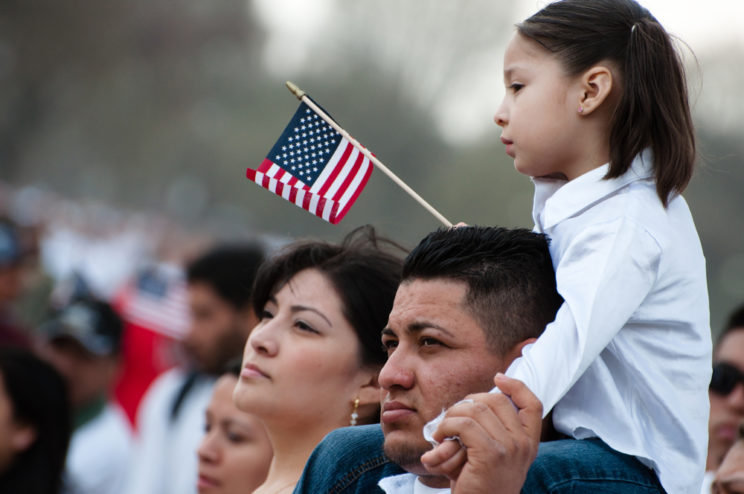December 10, 2018 – San Francisco – The Justice & Diversity Center (JDC) and the Bar Association of San Francisco (BASF) filed joint comments in response to the Department of Homeland Security (DHS) Notice of Proposed Rulemaking, “Inadmissibility on Public Charge Grounds.” The notice was published in the Federal Register on October 10. The 60-day public comment period ended December 10, during which more than 210,000 comments were submitted.
JDC and BASF strongly oppose the proposed changes to the public charge rule. If implemented, these changes will negatively impact family reunification for low-income immigrant communities, deter the lawful use of public assistance programs, and significantly hinder nonprofit legal services to these communities.
Read the filed letter in its entirety here.
Background
Current immigration law states that any “alien who, in the opinion of the consular officer at the time of application for a visa, or in the opinion of the Attorney General at the time of application for admission or adjustment of status, is likely at any time to become a public charge is inadmissible (Section 212(a)(4) of the INA).The DHS proposed rule would change the standard that is used when determining whether an alien is likely at any time in the future to become a public charge. For instance, the proposal defines a public charge as someone who simply uses a government program included on the list. The proposal also expands the list of publicly-funded programs immigration officers can consider when determining whether someone is likely to become a public charge. The past use of immigration fee waivers, for instance, would also be a negative factor, and immigration officials would also be allowed to consider the lack of English language proficiency as a negative factor.
BASF/JDC Comments
JDC and BASF strongly oppose the proposed changes to the public charge rules. If implemented, these changes will negatively impact family reunification for low-income immigrant communities in the United States, thereby violating our country’s commitment to fair and equitable immigration laws. The new rule will also deter the lawful use of public assistance programs in the United States, which are intended to promote public health and community stability. The entire community benefits when children and adults, regardless of their immigration status, have access to sufficient food, shelter and medical care.
JDC and BASF are also very concerned that the proposed rule will significantly increase the administrative burden on nonprofit legal services organizations and decrease the availability of pro bono or low-cost legal services and family-based immigration benefits to low-income immigrant communities.
JDC is one of the largest and most distinguished legal services providers in San Francisco. JDC advances fairness and equality by providing pro bono legal services in a range of legal areas to low-income people. It serves immigrants in all of its programs, and has two programs that specifically provide immigration legal services: the Immigrant Legal Defense Program (ILDP) and the Homeless Advocacy Project (HAP). The ILDP provides legal counsel to unrepresented immigrants with court cases or in immigration custody, and provides coordination and technical assistance to over 25 nonprofits in Northern California that serve low-income immigrants facing removal. For the past 30 years, HAP has provided direct legal services and supporting social services to individuals and families in San Francisco who are homeless or at imminent risk of homelessness, including immigrants in need of immigration documentation.
Since 1872, BASF has championed equal access to justice and promotes humanity, excellence, and diversity in the legal profession. Our members provide a range of legal services, including immigration legal services, to disadvantaged and underserved individuals in San Francisco. BASF also creates opportunities for pro bono legal service in the community and encourages participation by our members.
Negative impact on the community
The proposed rule has several features that will have a disproportionately negative impact on the populations served by JDC and BASF, especially persons with disabilities, low-income people, women and people of color who may lawfully rely on public benefits.
The proposed rule broadens the interpretation of public charge so that it applies not only to someone who relies on the government as his or her main source of support, but to anyone who participates in applicable health, nutrition or housing support programs. The proposed rule also expands the types of benefits that could be considered in a public charge test from certain cash assistance programs for income maintenance and government-funded long-term institutional care to include a broad array of cash and non-cash programs that do not provide income maintenance and may serve other important public interests, such as Medicaid health care coverage, supplemental nutrition assistance programs, low income subsidies for prescription drug costs, and rental assistance.
The proposed rule also changes the adjudication process from one that is reasonably straightforward to a multi-variable analysis that is increasingly complex and discretionary. In particular, the proposed rule will require adjudicators to calculate values for monetizable and non-monetizable benefits; examine a greater array of federal, state, local or tribal benefits; and more heavily weigh certain positive and negative factors that favor wealthy immigrants over those who are of lower-income, are not currently proficient in English, have large families, are seniors or children, or may have limited education.
In total, these changes to the public charge analysis will result in penalizing low-income and other immigrant community members who lawfully rely on public assistance programs, whether or not they are likely to become primarily dependent on the government in the future. The proposed rule undermines longstanding public policies recognizing that public benefit programs are vital to keeping individuals productive and our communities healthy and safe. These changes will also make it almost impossible for an immigrant to navigate the system without legal help, and yet lawyers will be hard-pressed to offer guidance without a clear legal standard. It will become substantially more difficult for applicants and their advocates to understand and evaluate their eligibility for permanent resident status in advance, as well as unnecessarily complicate the application process.
In addition, the proposed rule would increase processing delays for applications by requiring adjudicators to conduct time-intensive public charge inadmissibility determinations in an estimated 382,264 adjustment of status applications annually and an additional estimated 511,201 applications for extension or change of nonimmigrant status each year. Processing delays upend the lives of immigrants and their U.S. citizen families, as well as the employers and other community members who depend on these families. Lengthy wait times can result in applicants losing their jobs, thus depriving their families—including families with U.S. citizen children—of income essential to necessities like food and housing. Adjudication delays also lead to expiration of driver’s licenses, which immigrants may rely upon to access banking, medical treatment, and other indispensable services, as well as for transportation to school and work. Ironically, these delays will reduce immigrants’ ability to be self-sufficient, resulting in crises that leave them no choice but to access some kind of public benefit. Delays also prolong the separation of families dependent on case approval for their reunion.
The communities we serve have already expressed great uncertainty and confusion about the proposed rule and how it will be implemented. We are concerned that the new rule will prevent qualified applicants from using vital public benefits for which they are eligible or applying for family-based immigration benefits out of fear of a denial based on public charge grounds. Combined with U.S. Citizenship & Immigration Service’s new expanded policy for placing individuals with denied benefit applications into removal proceedings, immigrants who are entitled to lawful permanent residence may be too afraid to apply to adjust status, leading more people in the United States to remain without status or separated from family members.
Negative impact on non-profit legal services providers
The proposed rule also has several features that will have a disproportionately negative impact on our work and that of our legal services partners, who seek to efficiently and effectively allocate limited resources to meet an overwhelming need for pro bono or low-cost legal services.
As already noted, the new analysis in the proposed rule will create significant legal and administrative difficulties for advocates. When advising community members about whether they or their family members will be able to overcome the public charge ground and immigrate into the United States, advocates will not only have to assess many more factors and evidence, but also have less guidance for their conclusions.
The proposed rule will also increase the time that it takes to assist clients in preparing family-based immigration applications and gathering supporting documentation. Also, given the prolonged adjudication times for these more complex determinations, agencies will face difficulties in sustaining these cases on their caseloads while awaiting a final decision. The increased processing times for many existing immigration court cases and applications is already a significant problem for immigration non-profit advocates, who are already struggling to continue representing cases that are now taking far longer than anticipated. If cases take longer to complete, then agencies cannot assist as many individuals and families.
Thus, the increased burden on legal services providers from the new proposed rule will decrease the ability of agencies to provide much-needed representation to low-income immigrant community members, despite the fact that the need for legal assistance will increase along with the proposed rule.
Conclusion
In conclusion, JDC and BASF oppose the proposed rule because it undermines our longstanding value of fair and equitable immigration laws, and for its negative impact on our low-income immigrant communities and the dedicated pro bono legal services providers serving these communities.
###
The Justice & Diversity Center (JDC) of the Bar Association of San Francisco advances fairness and equality by providing pro bono legal services to low-income people and educational programs that foster diversity in the legal profession. JDC is the largest legal services provider in San Francisco. JDC’s primary purpose is the delivery of free legal services to low-income San Franciscans, as well as the non-profits that serve them. JDC delivers free legal services through its Legal Services Programs division, which consists of the Pro Bono Legal Services Program, Homeless Advocacy Project, and the Immigration Program. JDC provides enrichment programs to diverse youth and young adults through its Diversity Educational Programs. JDC’s programs serve approximately 9,500 disadvantaged San Franciscans a year, with the overarching goal of assisting the community’s most vulnerable members with accessing the judicial system and strengthening their personal, professional, and economic security.
The Bar Association of San Francisco (BASF) is a nonprofit voluntary membership organization of attorneys, law students, and legal professionals in the San Francisco Bay Area. Founded in 1872, BASF enjoys the support of more than 7,500 individuals, law firms, corporate legal departments, and law schools. Through its board of directors, its committees, and its volunteer legal services programs and other community efforts, BASF has worked actively to promote and achieve equal justice for all and oppose discrimination in all its forms, including, but not limited to, discrimination based on race, sex, disability, and sexual orientation. BASF provides a collective voice for public advocacy, advances professional growth and education, and attempts to elevate the standards of integrity, honor, and respect in the practice of law.




